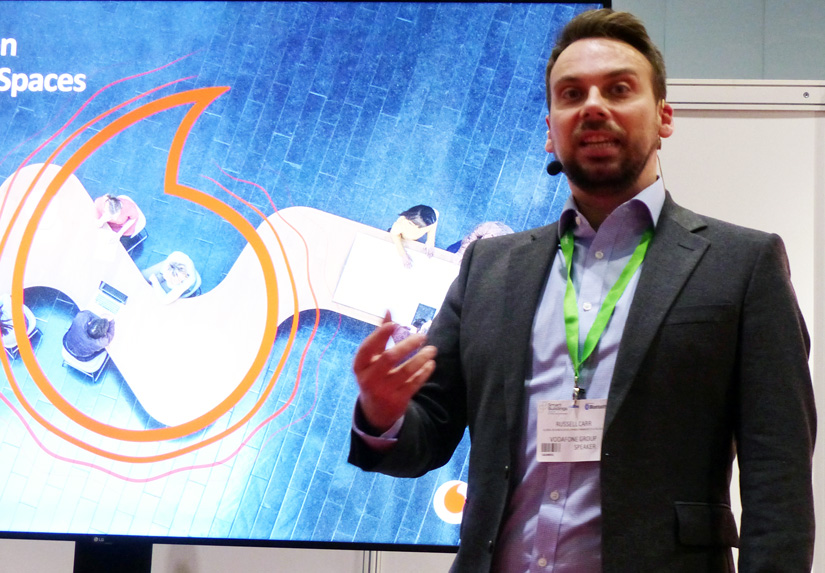Vodafone leads smart offices by example
- October 12, 2021
- Steve Rogerson

Vodafone is transforming its own offices and offering to help its customers do the same, said Russell Carr, the firm’s global business development manager for digital buildings, speaking at last week’s Smart Buildings Show in London.
“Buildings are changing in how we use them and what we expect from them,” he said. “We need to be more energy efficient. And there are supply-chain disruptions that we have to make sure don’t affect our operations.”
He also said there had been a change in the way people viewed offices from the days when everyone had their own cubicle as it found this made the office less productive.
“Ninety per cent of employees need more access to other staff,” he said. “It took decades to realise that open plan created a better outcome.”
He said a smart office should be built on three pillars – a better employee experience, operational efficiency, and sustainability and cost effectiveness.
The last was important because forty per cent of the world’s carbon emissions come from buildings so buildings needed to be designed to be more sustainable. Also, he said that as 85 per cent of existing buildings were expected to be still standing in 2050, that to solve the carbon problem retrofitting was important as just making new buildings efficient was not enough.
For operational efficiency, it is not uncommon for thirty to forty per cent of desk space to be wasted while staff struggle to find a meeting space despite only fifty to sixty per cent utilisation.
“This will be a key situation as we open our offices back up,” he said.
As to employee experience, he said there were many ways to improve the health and wellbeing of people in a building, such as better lighting, ventilation and temperature, which he said could increase productivity by a quarter.
“In our own buildings, we have tried to address these problems,” he said. We found that disparate systems were challenging to integrate and some of these were analogue systems that do not connect to the cloud. What we developed was the ability to use our SIM-enabled Raptor smart gateways to connect these systems.”
This platform is helping Vodafone develop a global view of the energy use in all its buildings. This included a more comprehensive system at its office in Paddington, London.
“We can see what is happening in real time and what is trending,” he said. “We can see the number of people on each floor and the number of available desks. We can also see the temperature and air quality. If you don’t have accurate data, you can end up making incorrect decisions.”
These included on meeting room bookings, for example, so it developed an office space app for room and desk bookings.
“We have very accurate information on where people are and how they interact with the space,” he said. “We can see which areas are less used so we can look at why they are not being used. Are they uncomfortable, too cold and so on.”
Carr said the plan was to roll this out to most of its buildings. The work on this was held up because of Covid, but is now back running.
“It is intended to be global,” he said. We have done a couple of buildings in the UK and some in South Africa. We have to look at local requirements.”
He said Vodafone was now offering this to other companies.
“We have some taking it on already but we can’t say which because they don’t want their staff to read about it in a press release before they come back to the office,” he said.





